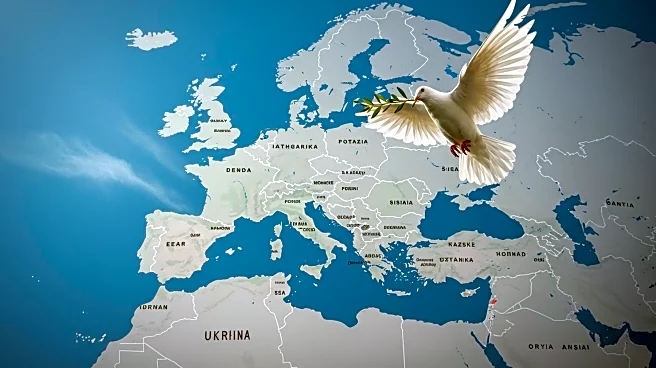What's Happening?
During a summit with President Trump, Russian President Vladimir Putin agreed to allow the United States and its European allies to offer Ukraine security guarantees similar to NATO's collective defense mandate. This development was announced by U.S. special envoy Steve Witkoff, who described it as a significant concession from Russia. The agreement aims to provide Ukraine with Article 5-like protection, which is a key reason for Ukraine's interest in NATO membership. European Commission President Ursula von der Leyen expressed support for President Trump's initiative, indicating that the European Union is prepared to contribute to these security guarantees. Ukrainian President Volodymyr Zelenskyy welcomed the U.S. signals of support but noted that details of the implementation remain unclear.
Why It's Important?
The agreement marks a potential shift in the geopolitical landscape, as it could serve as a workaround to Russia's longstanding objection to Ukraine's NATO membership. By offering NATO-like security guarantees, the U.S. and Europe may strengthen Ukraine's defense capabilities without formal NATO accession, potentially altering the balance of power in Eastern Europe. This move could also impact U.S.-Russia relations, as it represents a significant diplomatic achievement for President Trump. The security guarantees may bolster Ukraine's position in ongoing peace negotiations, providing a framework for future discussions on ending the conflict.
What's Next?
Further discussions are expected to take place at the White House, where President Trump will meet with Ukrainian and European leaders to explore the details of the security guarantees. The talks may address unresolved issues, such as the specifics of the guarantees and the roles of the U.S. and EU. Additionally, the potential for a peace agreement remains uncertain, with U.S. officials acknowledging that significant areas of disagreement persist. The outcome of these discussions could influence future diplomatic efforts and the stability of the region.
Beyond the Headlines
The agreement raises questions about the long-term implications for NATO and its member states. By offering NATO-like protections outside the alliance, the U.S. and Europe may set a precedent for similar arrangements with other non-member countries. This could lead to a reevaluation of NATO's role and its strategic objectives. Additionally, the agreement may impact Russia's foreign policy, as it navigates the consequences of conceding to Western security guarantees for Ukraine.











